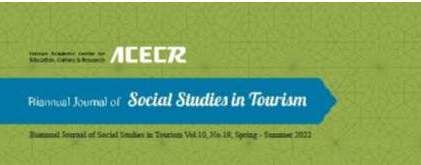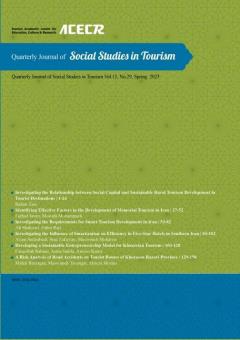The Interaction and Linking of Social Capital and Sustainable Development of Rural Tourism in Touristic Destinations Using the VICE Model
Subject Areas :
1 - Assistant Professor, Department of Tourism Management, Faculty of Management and Accounting, Allameh Tabataba’i University, Tehran, Iran
Keywords: Tourism, Sustainable Development of Tourism, Rural Tourism, Social Capital, VICE Model,
Abstract :
Social capital is increasingly recognized as a crucial determinant in fostering sustainable tourism, enjoying the potential to significantly influence the sustainable development of rural tourism destinations. Consequently, there is a compelling need to investigate its fundamental role in relation to other pertinent dimensions and aspects. In this regard, this study sought to elaborate the interplay and interconnectedness between social capital and sustainable rural tourism development within tourist-receiving areas, employing the VICE model as a theoretical framework. To this end, the study adopted a fundamental research approach using thematic analysis as its methodological framework. Through an inductive process, the researcher moved from specific observations to broader generalizations, extracting relevant dimensions, components, and indicators. The primary data collection instrument comprised semi-structured interviews conducted with 16 experts from diverse fields, including tourism, rural tourism, social sciences, sociology, rural management and planning, and cultural management who were selected via purposive sampling. The analysis of the interview transcripts yielded an initial set of 162 primary codes, which were subsequently synthesized into 79 basic themes, 28 organizing themes, and five overarching themes. To ensure the reliability and validity of the coded items, the the Guba and Lincoln model was applied, according to which the reliability and validity of the coded items were confirmed. According to the findings of the study, it can be argued that the linkage and interaction between social capital and sustainable rural tourism development can serve as a pivotal catalyst for the advancement and transformation of both tourist destinations and the tourism sector itself, fostering novel approaches that can empower and enhance the resilience of rural communities, particularly those vulnerable to environmental and tourism-induced changes.
فرجی ملائی؛ نعمتپور، محمد؛ عشریه، امید. (1396). تحلیل سیستمی اثرات مثبت و منفی توسعه گردشگری ایران با رویکرد
آینده پژوهی. مطالعات اجتماعی گردشگری، 9(5)، 151-190.
عینالی، جمشید؛ رومیانی، احمد. (1392). ارزیابی نقش سرمایه اجتماعی در توسعهی گردشگری روستایی با تأکید بر خانههای دوم مطالعهی موردی: دهستان حصار ولیعصر- شهرستان بوئینزهرا. فصلنامه علمی- پژوهشی برنامهریزی و توسعه گردشگری. 2(6)،52-74.
Agusta, A. R., & Ngadimun, N. (2024). Empowerment and Participation of Community Social Institutions in Educational Development Decisions in Rural. International Journal Education, School Management and Administration, 1(2), 26-38.
Akgün, A. Y. A., Baycan-Levent, T. N., Nijkamp, P., & Poot, J. (2011). Roles of local and newcomer entrepreneurs in rural development: A comparative meta-analytic study. Regional Studies, 45(9), 1207-1223.
An, W.; Alarcón, S. (2021). Rural Tourism Preferences in Spain: Best-Worst Choices. Ann. Tour. Res. 2021, 89, 103210.
Attride-Stirling, J. (2001), “Thematic Networks: An Analytic Tool for Qualitative Research”, Qualitative Research, 1(3), 385-405.
Barnard-Naude, J. (2017). ‘Grace Gets Angry’, or the ‘Tactics’ of Forgiveness: the Biopolitics of Reconciliation in the Postcolony. or the ‘Tactics’ of Forgiveness: The Biopolitics of Reconciliation in the Postcolony (May 26, 2017). Oñati Socio-Legal Series, 7(2).
Beaumont, S. (2022). OECD’s Rural Agenda for Climate Action Climate Action. Available online: https://www.oecd.org/regional/rural-development/Rural-Agenda-for-Climate-Action.pdf (accessed on 1 December 2022).
Birendra, K.C.; Morais, D.B.; Seekamp, E.; Smith, J.W.; Peterson, M.N. (2018). Bonding and bridging forms of social capital in wildlife tourism microentrepreneurship: An application of social network analysis. Sustainability 2018, 10, 315.
Braun, V. & Clarke, V. (2022). Thematic Analysis. A Practical Guide. SAGE, London.\
Braun, V., & Clarke, V. (2006). Using thematic analysis in psychology. Qualitative research in psychology, 3(2), 77-101.
Caalders, J. (2002). Rural tourism development: a network perspective. Wageningen University and Research.
Chen, B.; Qiu, Z.; Usio, N.; Nakamura, K. (2018). Tourism’s Impacts on Rural Livelihood in the Sustainability of an Aging Community in Japan. Sustainability. 2018, 10, 2896.
Cao, J., Qiu, H., Morrison, A. M., & Wei, W. (2022). The role of social capital in predicting tourists’ waste sorting intentions in rural destinations: Extending the theory of planned behavior. International Journal of Environmental Research and Public Health, 19(19), 12789.
Chin, C.H.; Lo, M.C. (2017). Rural Tourism Quality of Services: Fundamental Contributive Factors from Tourists’ Perceptions. Asia Pac. J. Tour. Res. 2017, 22, 465–479.
Christou, P.; Sharpley, R. (2019). Philoxenia offered to tourists? A rural tourism perspective. Tour. Manag. 2019, 72, 39–51.
Dai, M., Fan, D. X., Wang, R., Ou, Y., & Ma, X. (2021). Residents’ social capital in rural tourism development: Guanxi in housing demolition. Journal of Destination Marketing & Management, 22, 100663.
Einali, J., & Romiani, A. (2013). The Role of Social Capital in Rural Tourism Development with Emphasis Second Home Case Study; Hesar Valiasr County, Boeinzahra Township. Journal of Tourism Planning and Development, 2(6), 52-74. [In Persian].
Erokhin, V.; Heijman, W.; Ivolga, A. (2014). Sustainable Rural Development in Russia through Diversification: The Case of the Stavropol Region. Visegr. J. Bioecon. Sustain. Dev. 2014, 3, 20–25.
Faraji Molaei, A. Nematpour, M & Ashirieh, O. (2018). A Systematic Analysis of Positive and Negative Effects of IRAN Tourism Development Using a Future Study Approach. Social Studies in Tourism, 9(5), 151-190. [In Persian].
Garcia-Esparza, J.A. (2014). Revitalization of architectural and ethnological heritage: Recovery of vernacular building techniques in a 19th-century winery. Int. J. Archit. Herit. 2014, 8, 140–159.
Gardner, B. (2012). Tourism and the Politics of the Global Land Grab in Tanzania: Markets, Appropriation and Recognition. J. Peasant Stud. 2012, 39, 377–402.
Guba, E. G., & Lincoln, Y. S. (1982). Epistemological and methodological bases of naturalistic inquiry. ECTJ, 30(4), 233-252.
Hennessey, M., & Barnett, T. (2023). Method in limbo? Theoretical and empirical considerations in using thematic analysis by veterinary and One Health researchers. Preventive Veterinary Medicine, 221, 106061.
Hassan, T. H., Salem, A. E., & Abdelmoaty, M. A. (2022). Impact of rural tourism development on residents’ satisfaction with the local environment, socio-economy and quality of life in Al-Ahsa Region, Saudi Arabia. International journal of environmental research and public health, 19(7), 4410.
Hwang, J.H.; Lee, S.W. (2015). The Effect of the Rural Tourism Policy on Non-Farm Income in South Korea. Tour. Manag. 2015, 46, 501–513.
Ibănescu, B. C., Stoleriu, O. M., Munteanu, A., & Iațu, C. (2018). The impact of tourism on sustainable development of rural areas: Evidence from Romania. Sustainability, 10(10), 3529.
Jamal, T.; Higham, J. (2021). Justice and ethics: Towards a new platform for tourism and sustainability. J. Sustain. Tour. 2021, 29, 143–157.
Kenton, W. (2022). What is social capital? Definition, types, and examples. Investopedia. Retrieved April, 17, 2023.
Khazami, N.; Lakner, Z. (2021). The mediating role of the social identity on agritourism business. Sustainability 2021, 13, 11540.
Knollenberg, W., McGehee, N. G., Perdue, R. R., & Andereck, K. L. (2021). We’re All in This Together: Understanding How Tourism Advocates Build Relationships across the Tourism Industry. Journal of Travel Research, 60(2), 235-250. https://doi.org/10.1177/0047287520906216
Kusumastuti, A. (2016). Modal Sosial dan Mekanisme Adaptasi Masyarakat Pedesaan dalam Pengelolaan dan Pembangunan Infrastruktur. MASYARAKAT J. Sosiol. 2016, 20, 81–97.
Lane, B.; Kastenholz, E. (2015). Rural Tourism: The Evolution of Practice and Research Approaches—Towards a New Generation Concept? J. Sustain. Tour. 2015, 23, 1133–1156.
Lane, B.; Kastenholz, E.; Carneiro, M.J. (2022). Rural Tourism and Sustainability: A Special Issue, Review and Update for the Opening Years of the Twenty-First Century. Sustainability 2022, 14, 6070.
Larsen, J., & Bærenholdt, J. O. (2019). Running together: The social capitals of a tourism running event. Annals of Tourism Research, 79, 102788.
Liu, Y. L., Chiang, J. T., & Ko, P. F. (2023). The benefits of tourism for rural community development. Humanities and Social Sciences Communications, 10(1), 1-12.
Martins, A.R.O.; Shackleton, C.M. (2022). The Contribution of Wild Palms to the Livelihoods and Diversification of Rural Households in Southern Mozambique. For. Policy Econ. 2022, 142, 102793.
Michalska-Zyła, A.; Marks-Krzyszkowska, M. (2018). Quality of Life and Quality of Living in Rural Communes in Poland. Eur. Countrys. 2018, 10, 280–299.
Naser, E., & Abbas, B. N. (2011). Effects of positive and negative rural tourism (Case study: Rural Semnan Province). Journal of Geography and Regional Planning. 4(2), 63-76.
Nordbø, I. (2022). Female Entrepreneurs and Path-Dependency in Rural Tourism. J. Rural Stud. 2022, 96, 198–206.
Nugraha, A.T.; Prayitno, G.; Hasyim, A.W.; Roziqin, F. (2021). Social capital, collective action, and the development of agritourism for sustainable agriculture in rural Indonesia. Evergreen 2021, 8, 1–12.
Nunkoo, R. (2017). Governance and sustainable tourism: What is the role of trust, power and social capital?. Journal of Destination Marketing & Management, 6(4), 277-285.
Puspitaningrum, E.; Lubis, D.P. (2018). Modal Sosial dan Partisipasi Masyarakat dalam Pembangunan Desa Wisata Tamansari di Kabupaten Banyuwangi. J. Sains Komun. dan Pengemb. Masy. 2018, 2, 465–484.
Reina-Usuga, L., Camino, F., Gomez-Casero, G., & Alba, C. A. J. (2024). Rural tourism initiatives and their relationship to collaborative governance and perceived value: A review of recent research and trends. Journal of Destination Marketing & Management, 34, 100926.
Robson, J., & Robson, I. (1996). From shareholders to stakeholders: critical issues for tourism marketers. Tourism management, 17(7), 533-540.
Roman, M., Kudinova, I., Samsonova, V., & Kawęcki, N. (2024). Innovative Development of Rural Green Tourism in Ukraine. Tourism and Hospitality, 5(3), 537-558.
Ramos-Tumanan, M. A., & Ryan, C. (2019). Chinese rural tourism–Seeking a Chinese perspective from an emic stance, or a case of post hoc reflection?. Tourism Management, 75, 284-292.
Sbarcea, M.; Tudor, M. (2020). Tradition and modernity in Danube Delta architecture contemporary intervention towards sustainable settings. J. Environ. Prot. Ecol. 2016, 17, 1194–1202.
Shafieisabet, N., & Haratifard, S. (2020). The empowerment of local tourism stakeholders and their perceived environmental effects for participation in sustainable development of tourism. Journal of Hospitality and Tourism Management, 45, 486-498.
Shen, S.; Wang, H.; Quan, Q.; Xu, J. (2019). Rurality and Rural Tourism Development in China. Tour. Manag. Perspect. 2019, 30, 98–106.
Shi, B., & Fan, H. (2022). New Path Innovation of Rural Tourism Development Based on Mobile Communication. Mobile Information Systems, 2022(1), 5772204.
Stetic, S. (2012). Specific features of rural tourism destinations management. J. Settl. Spat. Plan. 2012, 1, 131–137.
Su, Y.; Li, R.; Ma, H.; Huang, L. (2022). Adaptive Change of Institutions and Dynamic Governance of the Tragedy of the Tourism Commons: Evidence from Rural China. J. Hosp. Tour. Manag. 2022, 53, 32–49.
Sutomo, Y. A., Sianipar, C. P., Hoshino, S., & Onitsuka, K. (2024). Self-Reliance in Community-Based Rural Tourism: Observing Tourism Villages (Desa Wisata) in Sleman Regency, Indonesia. Tourism and Hospitality, 5(2), 448-471.
Teng, Y.-M.; Wu, K.-S.; Wang, W.-C. (2022). Exploring Rural Winery Loyalty: The Effect of Visitors’ Experience in Taiwan Rural Winery Tourism. J. Rural Stud. 2022, 96, 32–41.
UNWTO/UNEP (2005). https://wedocs.unep.org/bitstream/handle/20.500.11822/8741/-Making%20Tourism%20More%20Sustainable_%20A%20Guide%20for%20Policy%20Makers-2005445.pdf?sequence=3&isAllowed=y
Usher, L.E.; Kerstetter, D. (2014). Residents’ Perceptions of Quality of Life in a Surf Tourism Destination: A Case Study of Las Salinas, Nicaragua. Prog. Dev. Stud. 2014, 14, 321–333.
Utami, D.D.; Dhewanto, W.; Lestari, Y.D. (2021). Rural tourism entrepreneurship success factors for sustainable tourism village: Evidence from Indonesia. Cogent Bus. Manag. 2023, 10, 2180845.
Uysal, M.; Sirgy, M.J.; Woo, E.; Kim, H.L. (2016). Quality of Life (QOL) and Well-Being Research in Tourism. Tour. Manag. 2016, 53, 244–261.
Weyland, F.; Colacci, P.; Cardoni, A.; Estavillo, C. (2021). Can Rural Tourism Stimulate Biodiversity Conservation and Influence Farmer’s Management Decisions? J. Nat. Conserv. 2021, 64, 126071.
Widawski, K.; Oleśniewicz, P. (2019). Thematic Tourist Trails: Sustainability Assessment Methodology. The Case of Land Flowing with Milk and Honey. Sustainability 2019, 11, 3841.
Woods, M. (2006). Redefining the ‘rural question’: The new ‘politics of the rural’and social policy. Social Policy & Administration, 40(6), 579-595.
Xue, L.; Kerstetter, D. (2018). Discourse and Power Relations in Community Tourism. J. Travel Res. 57, 757–768.
Yang, X.; Hung, K.; Xiao, H. A (2019). Dynamic View on Tourism and Rural Development: A Tale of Two Villages in Yunnan Province, China. J. China Tour. Res. 2019, 15, 240–261.
Zhang, X.; Zhang, Z. (2020). How Do Smart Villages Become a Way to Achieve Sustainable Development in Rural Areas? Smart Village Planning and Practices in China. Sustainability 2020, 12, 10510.
Zhang, Y.; Xiong, Y.; Lee, T.J.; Ye, M.; Nunkoo, R. (2020). Sociocultural Sustainability and the Formation of Social Capital from Community-based Tourism. J. Travel Res. 2020, 60, 656–669.

